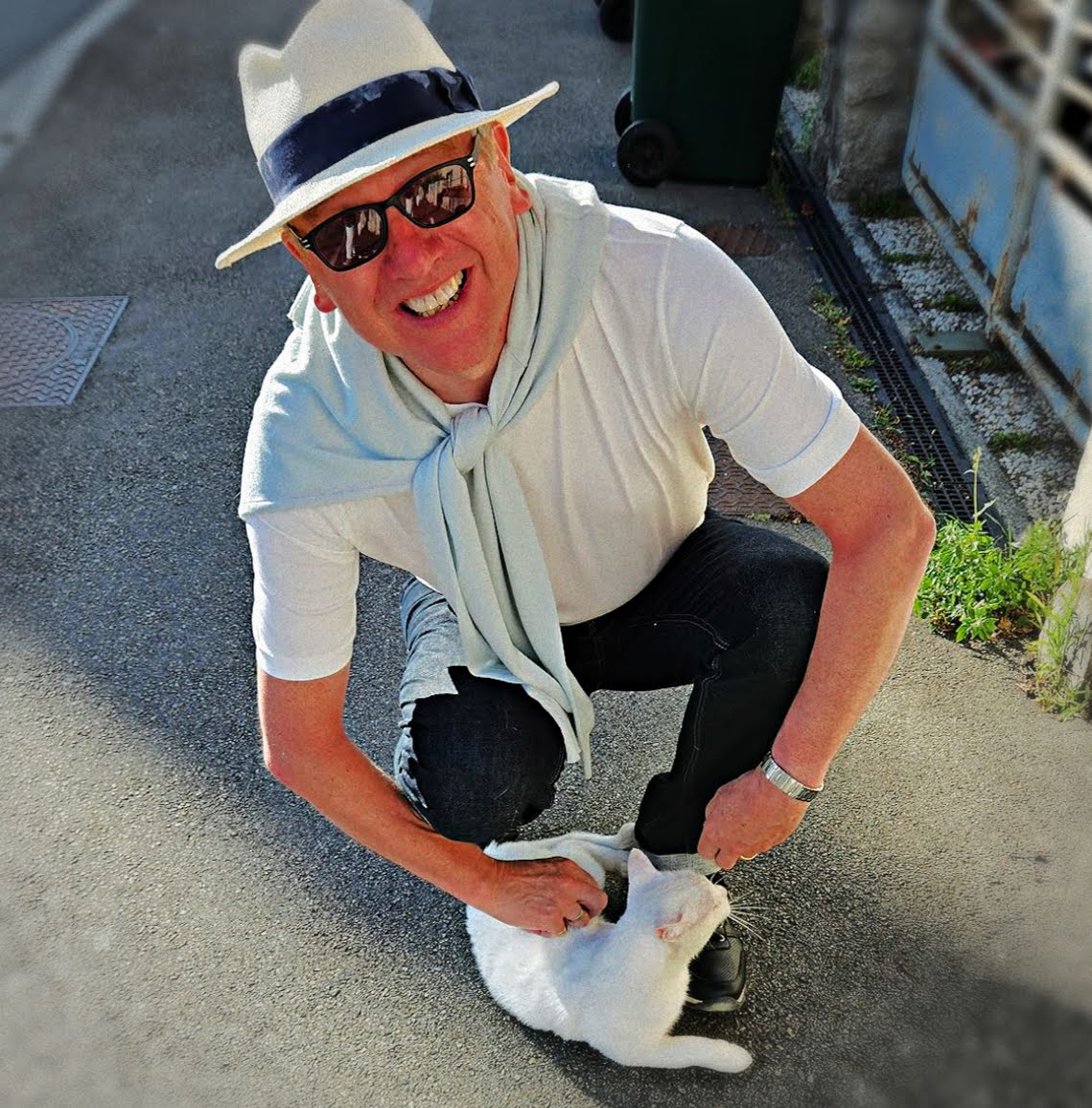Let’s start with a list.
A 12” single of ‘Missing You’ by AOR balladeer John Waite.
A white, extra large Depeche Mode T-shirt for ‘Master & Servant’.
A cassette of ‘Rusty Old Halo’, an album by the American country singer Hoyt Axton.
The new single by The Staple Singers, their cover version of Talking Heads’ ‘Slippery People’.
An advance, white label vinyl pressing of the latest album by Van Morrison.
A similar, upfront DJ copy of the new 12” single by Paul Quinn and Edwyn Collins.
A red sweatshirt (medium) for Andrew Lloyd Webber’s ‘Starlight Express’.
It’s the kind of random pile that you could find at a car boot sale, where you might cherry pick a couple of bits at 50p each and leave the rest.
Not me.
This motley collection is piled up at home in the corner of my living room. Why? Because they were all free. Picked up with a kid-in-a-sweet-shop glee by me, from a big box of unwanted gratis stuff in the staff room at my new place of work: Virgin Records on Sheffield High Street.
The free stuff gets dropped off by the representatives, known simply as “reps”, of the record companies: A&M, Island, Chrysalis, EMI, CBS and the rest. The reps are almost exclusively youngish men in their twenties or early thirties. A shoal of mullet haircuts, stonewashed jeans, basketball sneakers, tee-shirt, topped off with a jacket in denim or occasionally satin, advertising whatever artist is getting the priority push that particular month. As someone who has only ever been on the customer side of the counter until now, I’m amazed how much free stuff we are given. Punnets and punnets of Strawberry Switchblade singles, waves and waves of Billy Ocean 45s.
“I’ll just leave a few more free ones”, says Mr. Warners, “maybe pop a couple more through for us when you get a chance?” The process being alluded to is entering the singles’ catalogue number into a computerised data collection machine when a sale is made. More specifically, as is usually the case with the records the reps are pushing, adding a few extra fake sales. This valuable information is transmitted to Gallup, who compile the official charts used by BBC Radio 1 and Top Of The Pops. Therefore anyone with easy access to these devices is of some significant value to the reps.
No-one would ever admit to hyping, as this dark art is known, it’s strictly against the rules. But this doesn’t stop the reps from trying to bend said rules when the pressure is on from their London-based bosses. If a record can be craftily nudged up from the shifty 50 to the naughty 40 and, with that, is suddenly in contention for a Top Of The Pops slot, it can make the record a hit. So we help out the reps. The reps reward us. Quid pro Status Quo.
There is a Gallup machine next to the till where I spend most of my working day. Compared to the NCB, this is a doddle. Swapping a skipping copy of Mötley Crüe’s ‘Shout At The Devil’ is a lot easier than explaining to a tearful widow from Consett that she will in fact continue to receive her late husband’s redundancy payments.
We also sell concert tickets. There is a little steel box under my counter where the tickets and customer cash are stashed. There are plenty of takers for Hanoi Rocks at the Poly and The Enid at the University. We’ve also been selling a lot of tickets for a one-day event sixty miles up the road from here: The First York Rock Festival at the local race course, which is being headlined by Echo & The Bunnymen. As a thank you for our support, the promoter has given the store two pairs of tickets. Nobody else in the shop wants to go all the way to York, so they trickle down to me.
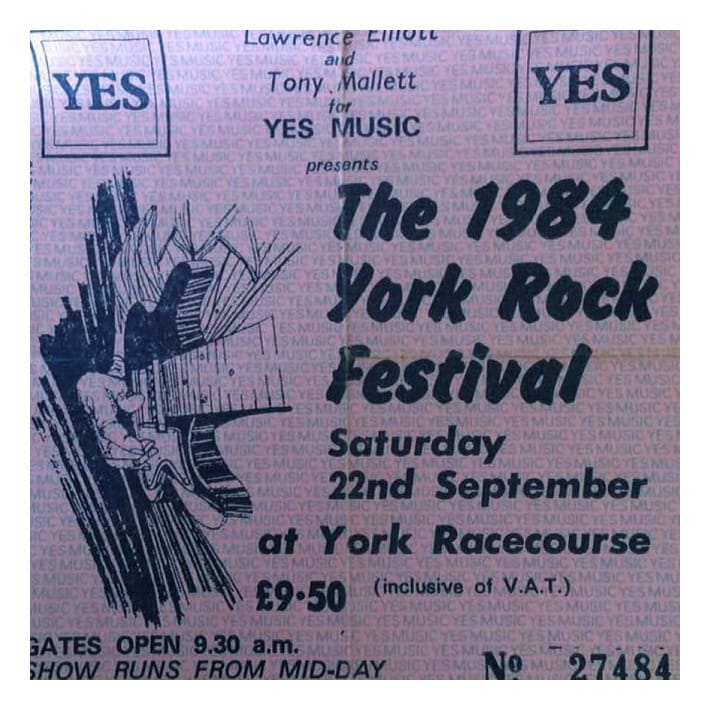
I reckon you would get long-odds on making a success of an outdoor music festival on the fourth Saturday in September in North Yorkshire. Summer has passed the finishing post as Autumn weighs out in the jockey’s room, resplendent in her silks of red and orange. However, the local promoters think they have spotted a gap in the market. There is no Reading Festival this year, the Conservative council having decided that they didn’t want loads of drunken rock fans taking over the town on the August bank holiday weekend. And while there is a three-day festival at nearby Wakefield, its headliners - Van Morrison, Lindisfarne and Steeleye Span, and main sponsor, Theakstons Brewery, all suggest a gathering so folky-blokey that it should come wrapped in a baccy-stained Arran jumper with a Ploughman’s Lunch on the side.
Top of the York Rock promoters’ wish-list were U2, but they have worked their way down through Simple Minds, Siouxsie and The Banshees, The Alarm and even Marillion, before arriving at Liverpool’s Echo & The Bunnymen, who are enjoying a run of hits from their new, critically-revered ‘Ocean Rain’ album. They have also smartly included a raft of bands from Manchester, Leeds and York on the bill, so the feel of the line-up is distinctly youthful, alternative, Indie and Northern. Add in special guests Spear Of Destiny from down South and you’ve got a very decent day out, with no hippies, bikers or football fans. All for less than a tenner.
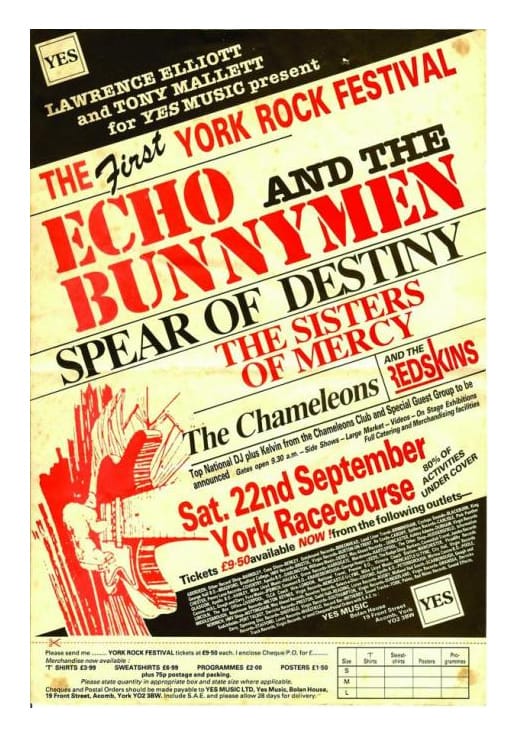
We arrive at York Racecourse mid-afternoon. I’m with new girlfriend Terri, my niece Angela and her boyfriend Steve, who has driven us up from Sheffield in his VW Beetle. On arrival, I’m thrilled to find that our tickets give us access to backstage and the VIP lounge. It has been raining overnight and for much of the morning. In racing parlance, I’d say the going underfoot is good-to-soft. Grand if you’ve got Doc Martens on, challenging for anyone in heels. The VIP lounge is a large room full of comfy armchairs and coffee tables. The walls are covered in framed photographs and paintings of famous horses and jockeys who have triumphed on the Knavesmire course since the middle of the eighteenth century. I’ve never flown business-class, but I imagine the exclusive, invitation-only, airline departure lounges are something like this, except with matronly ladies called Peggy from Knaresborough bringing you your drinks and snacks, all of which are on the promoters’ tab.
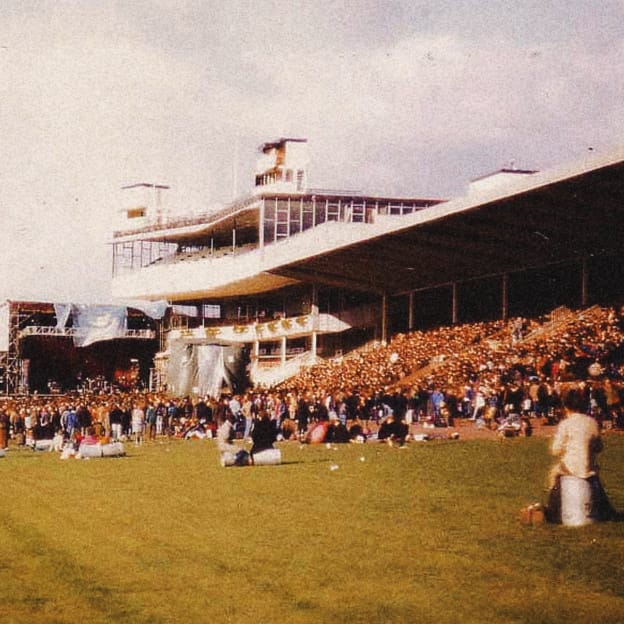
We’re blagging T-shirts, enjoying another round of free pints and availing ourselves of the no-queue, clean toilets. I could get used to this. The only drawback is you can’t see the stage. If you could, I doubt I’d leave this spot all day. We’ve missed The Chameleons from Manchester and local lads Redskins. I’m comfortably into another pint when the unexpected intonation of what sounds like Joy Division murkily covering Hot Chocolate’s ‘Emma’ pushes against the lounge windows. Curiosity piqued, I venture outdoors.
The sun has come out and there is a good crowd gathered in front of the stage. Onstage are four guys in their early-twenties with matching raven-black, shoulder-length hair. All are dressed in black or charcoal grey, except the lead guitarist, who clearly didn’t get the dress code memo, as he is wearing a bright blue shirt. They don’t have a live drummer, the beats are provided by a Boss Dr. Rhythm drum machine. This is The Sisters Of Mercy, who have made the short journey from Leeds, and appear to have brought a lot of their fans with them.
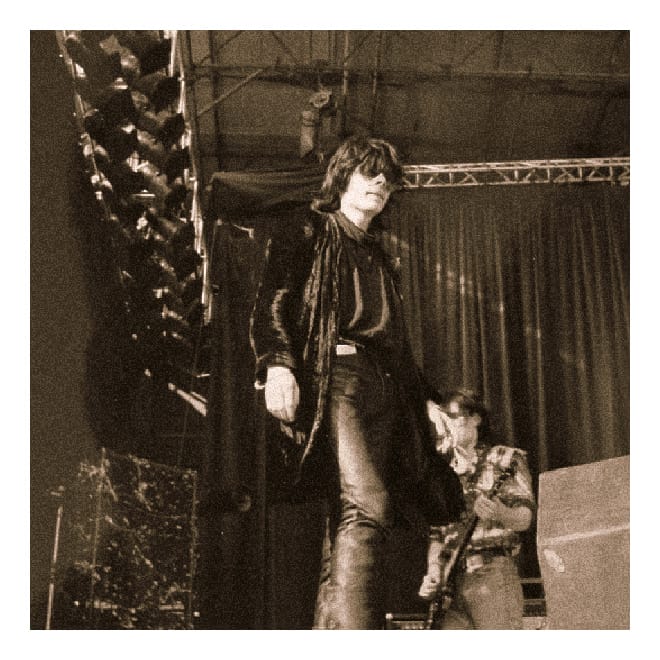
Unbeknownst to me, just a few months from now, I’ll be working at the Virgin shop in Leeds, deep in the Sisters’ heartland, and copies of their debut album will be flying out like bats fleeing a clanging belfry. Right now their reputation is growing rapidly, following the release of a trio of 12” EPs on their own Merciful Release record label. Led by singer Andrew Taylor, who has chosen Andrew Eldritch as his splendidly appropriate stage name, it seems to me that they are harnessing a particular kind of Northern melancholy. Connecting with dreamy teenage boys and girls, the outsiders who hang around sleepy market squares as dusk descends, making cans of cider last for hours while listening to hissy Cure and Bauhaus tapes on tinny speakers. A Yorkshire of long-shuttered cotton mills and coal mines marked for closure. Like Robert Smith and Peter Murphy, Eldritch bathes in the same inky black lake. In his Aviator shades, leather trousers and crushed velvet jacket, with his mysterious tales of anacondas and reptile houses, he’s every inch the magnetic, local lizard king. A Morrison’s Jim Morrison if you will.
They play another cover. A woozy, skew-whiff violation of The Rolling Stones’ ‘Gimme Shelter’. Its apocalyptic warnings of storms, floods and fires suit the band to a tee. Even if the shelter that Eldritch is seeking at that particular moment is a darkened room away from the low, bright September sunlight that is flooding the racecourse this afternoon. To paraphrase another Stones’ song, I know, it’s Edgar Allen Poe, but I like it, like it, yes I do.
I’ve haven’t been able to take Kirk Brandon seriously since 1982, when NME journalist Paul Morley did a full-page review of his last band Theatre Of Hate that was largely a critique of Mr. Brandon’s ears. Bands too are often cruel to each other, in The Box we have already renamed his new band Spear Of Destiny as Spear Of Broccoli. A straight-ahead rock band with added piano and saxophone, to me they sound like Tommy Steele fronting an E-numbers E-Street Band. However, after the gloomy strangeness of The Sisters Of Mercy, they do manage to stir the now very busy crowd down the front into action.
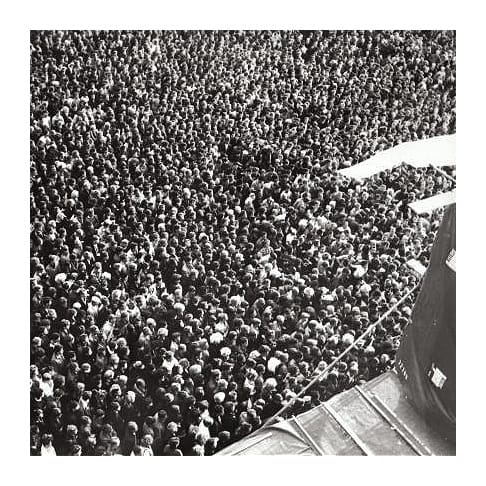
Things are running heroically late. Echo & The Bunnymen were listed as going onstage at 6.30pm, but it’s nearer to 9 when they are finally ready. Somewhat drunk and feeling cocky, showing off in front of Terri, I lead my little gang down from the VIP lounge, waving my precious pass at bored, tired security staff until we find ourselves at the monitor mixing desk at the side of the stage. A couple of hard “who the fuck are you?" looks from the Bunnymen’s roadies reminds me that these people are actually working and can do without a pissed-up ligger getting in the way. Don’t be a knob Rog. I sheepishly lead Terri, Angela and Steve out into the stands, where we find a good vantage point to watch the band.
The last man to headline this venue was The Pope, who celebrated Mass here with around 200,000 souls two years ago. The joke here, of course, is that while the pontiff is God’s chief representative on earth, Echo & The Bunnymen’s chief pontificator, Ian McCulloch, with his mouth the size of the entrance to the Mersey Tunnel, merely thinks he is God.
In spite of this, I like him and his band. I bought their debut single ‘The Pictures On My Wall’ when it was released five years ago, and was disappointed when they dropped out of a Zoo Records gig with fellow Liverpudlians The Teardrop Explodes at Sheffield University later in 1979. Their second album - ‘Heaven Up Here’, was probably my most played record of 1981, and I loved the ‘Shine So Hard’ live EP. Their recently released long-player is called ‘Ocean Rain’, and McCulloch has, with typical immodesty, described it as “the greatest album ever made”. I haven’t heard it yet. We’re much too busy in the shop listening to Springsteen, ZZ Top and Van Halen to give it an airing. US guitar rock with a side order of country twang dominate the Virgin instore sound system.
Echo & The Bunnymen played at the Futurama 2 festival in Leeds in 1980, on the same day as DVA, and were one of my highlights of the entire event. Since then, they’ve averaged a gig every six days somewhere in the world. Which is impressive, until you note that U2, who also played that same day in Leeds, have averaged a live show once every five days. It’s highly competitive out there at the business end of post-punk guitar rock, and The Bunnymen are a hard working band. The winning scrawny clatter that charmed me back then has now been fine-tuned and refined into an incontestable surge of empathetic energy, which flows between the players onstage and out into their audience.
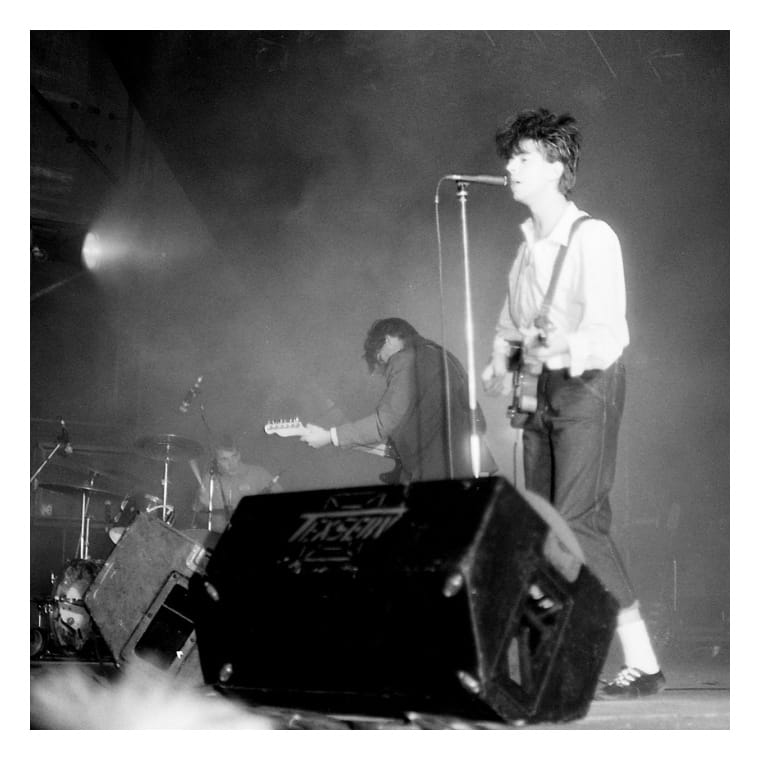
Will Sergeant plays the instantly recognisable chiming guitar intro to ‘Rescue’, and suddenly I’m back on the dance floor in the Limit Club in 1981. They play a lot of new songs which are unknown to me, but nonetheless there is still much to enjoy in witnessing the instinctive interplay between the musicians, particularly Les Pattinson on bass guitar and Pete de Freitas, who, along with Budgie and Stephen Morris, is one of my favourite drummers of the post-punk era. As for Ian McCulloch, he’s a bit subdued and mumbly between songs but leads the band with an easy self-confidence. He knows they are on a roll and lets the songs speak for themselves.
The newer, less-familiar songs give way to well-known hits like ‘Back Of Love’ and ‘Never Stop’. Out on the race course, in the rolling haze of drifting smoke dimly illuminated by the stage lighting rig, the now huge crowd surrenders and cheers like they all backed Lester Piggott to romp home in the Ebor Handicap. We decide to leave early to beat the traffic.
Back at work on Monday there’s David Bowie’s new album, ‘Tonight’, to listen to. At least that’s what the cover says; but the bloke wearily singing these bland insipid covers of Brian Wilson and Iggy Pop songs surely can’t be the same David Bowie who did ‘Rebel Rebel’ and ‘Heroes’? ‘Invasion Of The Bowie Snatchers’ is a film I thought I’d never see.
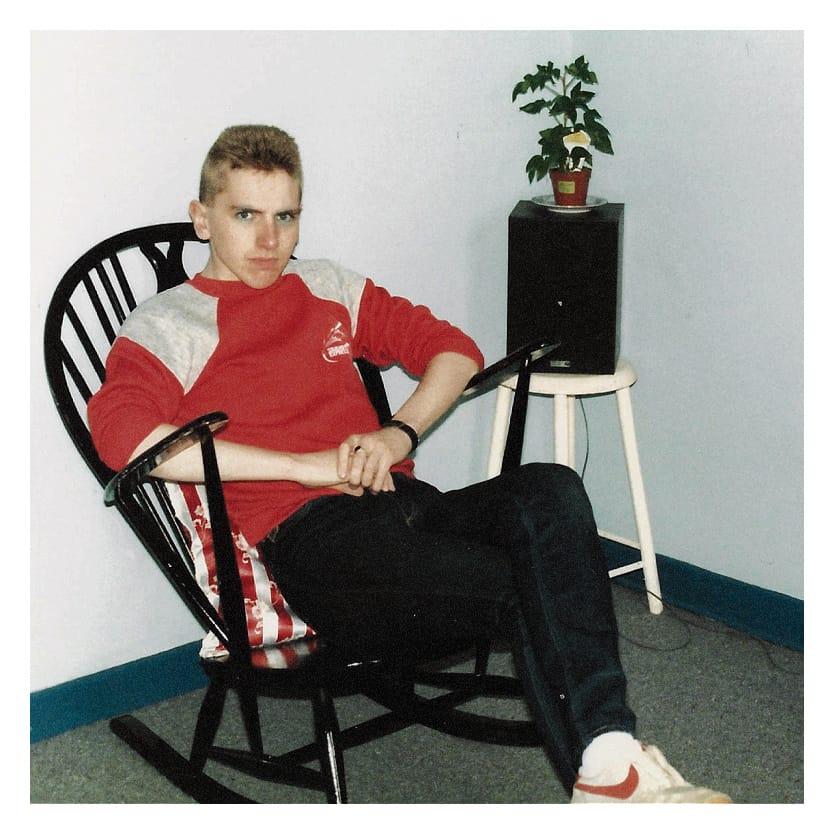
I pick up a couple more bits from the freebie pile, an Aswad single and a tape by Prince protégé Sheila E. Some of the label reps call in and ask for a couple of favours, and I say I’ll see what I can do. One of my favourite singles of the post-punk era is ‘We Are All Prostitutes’ by The Pop Group. “We are all prostitutes”, sang Mark Stewart, “everyone has their price.” The song came out in 1979, not long after I had joined DVA as a naive, teenage idealist. Five years on, it’s not the compromise that surprises me, but that my modest going rate is just a handful of free records and a couple of crappy t-shirts.
This was ambitiously billed as The First York Rock Festival. The promoters lost a lot of money so it was sadly also the last.
I met Kirk Brandon in the Virgin Megastore in Oxford in 1987. The Virgin Records' rep was taking him around doing promo for the Spear Of Destiny single 'Never Take Me Alive', which turned out to be the band's biggest hit single, reaching number 14 on the chart. Kirk was polite and professional, he almost certainly had better things to be doing than schlepping around record shops, but he was a pleasure to meet.
Remembering Pete De Freitas, who died in a motor-cycle accident in 1989, aged just 27.
With thanks to Mark Jones and Nick Robinson. Special thanks to my editor Nigel Floyd.
Here is a Spotify playlist with tracks from the bands who played the festival, together with a selection of big alternative tunes from the late summer of 1984.
Remembering Pete De Freitas, who died in a motor-cycle accident in 1989, aged just 27.
